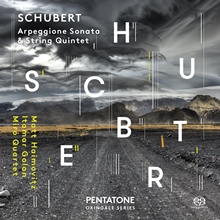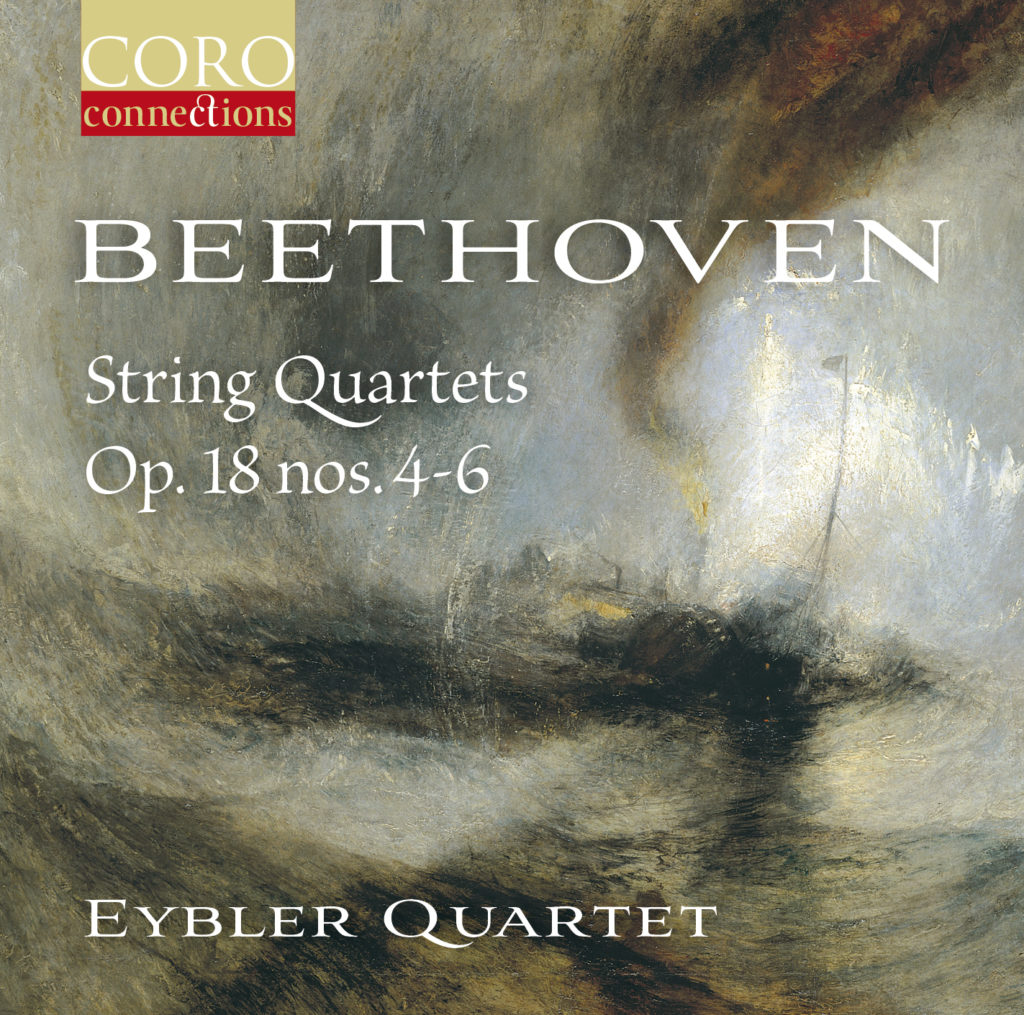
“Simply stunning … jaw-dropping agility, clarity and accuracy in the playing, allied with terrific dynamics and nuance, outstanding ensemble work …I doubt if you’ve heard these works sound like this before – it’s absolutely essential listening.” – The WholeNote (on Beethoven, Op. 18, Vol. 1)
[Français ci-dessous]
When British label CORO Connections released their first recording from Toronto’s Eybler Quartetlast spring, they may havebeen surprised to have a controversy on their hands. The Eybler’s versions of Beethoven’s Op. 18 quartets, nos. 1-3, on period instruments, took many aback due to their astonishing speed, particularly in the scherzofrom Quartet No. 1. Gramophonecalled it “straight-up hilarious … this set might infuriate you or it might delight you,” continuing, “ either way, I suspect, Beethoven would have been more than happy.” The Times of Londonbemoaned that “this brilliant Canadian quartet [left] me feeling my age … yet there is no denying the Eyblers’ verve and delicacy of touch.” Now, the new recording of the Beethoven Op. 18 Quartets, nos. 4-6fulfils the wish of Early Music America, who wrote last year: “With nearly 70 minutes of masterfully played Beethoven, this recording leaves you waiting for the Eybler to complete the Opus 18 cycle.” The new release is available in digital form from May 31, with the CD version for sale as of June 7.
The musical controversy arose from the Eybler’s choice to follow Beethoven’s original and supposedly “impossible” metronome markings – which have caused some to speculate on Beethoven’s sanity – to the letter. As an early music quartet, the Eyblers approached Beethoven’s Op. 18 as “new music,” working from different editions of the score while delving deeply into exhaustive critical notes on the works. Violist Patrick Jordan comments, “Looking back through the almost 200 years since Ludwig van Beethoven’s death, it is remarkably easy to repeat to ourselves the narrative of Beethoven’s transcendent seriousness, greatness and genius.” However, he continues, “we also discovered depths of humour, wit and irony in Beethoven that we had not found before, in particular his ready embrace of the commedia dell’arte.” Jordan’s unusually witty liner notes describe the almost operatic Quartet no. 4 in C Minor, with its “blisteringly fast coda”; the cheerful Quartet no. 5 in A Major, with its “lilting Ländler” leading to a “slightly tipsy” Trio; and the Quartet no. 6 in B-flat Major, which“displays the widest emotional range to be found in the set.”
The Eybler Quartetbrings a unique combination of talents and skills: years of collective experience as chamber musicians, technical prowess, experience in period instrument performance and an unquenchable passion for the repertoire. Violinist Julia Wedmanand violist Patrick G. Jordanare members of Tafelmusik Baroque Orchestra;Violinist Aisslinn Noskyis concertmaster of the Handel and Haydn Society and Principal Guest Conductor of the Niagara Symphony Orchestra; Julia and Aisslinn are also members of I FURIOSI Baroque Ensemble. Cellist Margaret Gay is much in demand as both a modern and period instrument player. The Eybler Quartet’s previous, critically-acclaimed albums includechamber music of Vanhal, Haydn, Mozart, Backofen, and of course, the quartet’s namesake, Joseph Leopold Edler von Eybler.
CORO Connections is an imprint of the award-winning CORO record label.All of the artists on CORO Connections have links toHarry Christophers, The Sixteen, or the Handel and Haydn Society. Eybler Quartet violinist Aisslinn Noskyis concertmaster of Boston’s Handel and Haydn Society.
Quand la maison britannique CORO Connections a fait paraître son premier enregistrement du Quatuor Eybler de Toronto, au printemps dernier, elle ne s’attendait pas à une controverse. Cette interprétation des quatuors de Beethoven, opus 18, nos 1 à 3, avec des instruments d’époque, en a surpris plus d’un par sa vitesse ahurissante – surtout en ce qui concerne le scherzodu premier quatuor. Gramophonel’a décrite comme « proprement hilarante; cette prestation pourrait soit vous ravir, soit vous enrager », ajoutant que « dans tous les cas, Beethoven lui-même serait aux anges. » Selon le Timesde Londres, « ce brillant quatuor canadien est difficile à suivre passé un certain âge. Cela dit, impossible de nier la verve et la délicatesse du Eybler ». Ce nouvel enregistrement des Quatuors de Beethoven, opus 18, nos 4 à 6, a quant à lui su combler les attentes de Early Music America, qui a écrit l’an dernier : « Avec près de 70 minutes d’un Beethoven interprété avec brio, l’enregistrement ne donne qu’une envie : que le Quatuor Eybler complète le cycle de l’opus 18. »La nouvelle parution sera disponible en format numérique dès le 31 mai, et l’album, en vente à partir du 7 juin.
S’il y a eu controverse, c’est que le Quatuor Eybler suit à la lettre la cadence originale choisie par Beethoven, réputée irréalisable – à tel point que certains l’ont cru fou. En tant que quatuor spécialiste de la musique ancienne, le Eybler envisage l’opus 18 de Beethoven comme une œuvre « nouvelle », comparant différentes versions des partitions tout en étudiant en profondeur les essais critiques à leur sujet. Selon l’altiste Patrick Jordan, « au fil des quelque 200 ans écoulés depuis la mort de Ludwig van Beethoven, on a dressé le portrait d’un homme éminemment sérieux, au génie grandiose. Toutefois, poursuit-il, nous avons également relevé chez lui des traits d’humour, de vivacité et d’ironie que nous ne lui connaissions pas, notamment une grande affection pour la commedia dell’arte. » Dans son humoristique texte de pochette, Patrick Jordan décrit la coda du quasi opératique Quatuor no 4 en do mineur, « rapide à en provoquer des ampoules », le Ländler cadencé du joyeux Quatuor no 5 en la majeur, prélude à un Trio « légèrement ivre », et le Quatuor no 6 en si bémol majeur, l’œuvre du cycle « offrant la plus riche gamme d’émotions ».
Le Quatuor Eyblerpropose un mélange unique de talents et d’habiletés, soit des années d’expérience en musique de chambre, de véritables prouesses techniques, une grande connaissance des instruments d’époque et une passion sans borne pour le répertoire. La violoniste Julia Wedmanet l’altiste Patrick G. Jordansont membres du Tafelmusik Baroque Orchestra; Aisslinn Noskyest premier violon de la Handel and Haydn Society et principale chef invitée de l’Orchestre symphonique de Niagara. Ajoutons que Mmes Wedman et Nosky sont également membres de l’ensemble baroque I FURIOSI. Enfin, la violoncelliste Margaret Gaymaîtrise aussi bien les instruments contemporains que les instruments d’époque. La discographie acclamée du Eybler Quartet comprend aussi des œuvres de chambre de Vanhal, Haydn, Mozart, Backofen et, bien entendu, Joseph Leopold Edler von Eybler, qui a donné son nom au quatuor.
CORO Connections est une branche de CORO, maison de disques primée. Tous les artistes représentés par CORO Connections sont liés à Harry Christophers, à The Sixteen ou à la Handel and Haydn Society. Aisslinn Nosky,violoniste du Eybler Quartet, est d’ailleurs premier violon de la Handel and Haydn Society, à Boston.

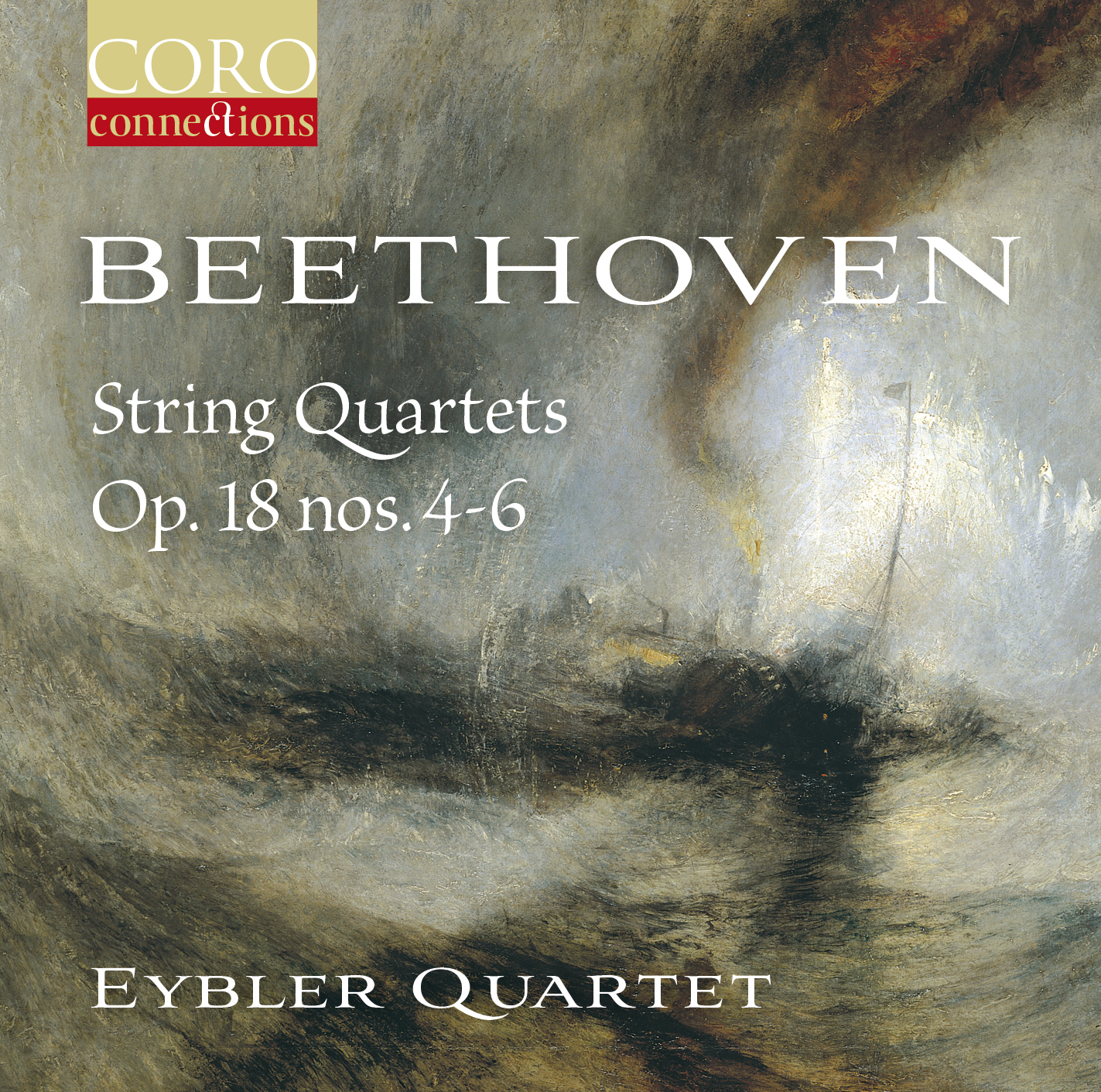
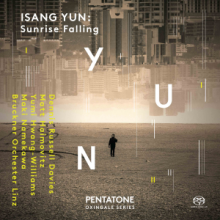
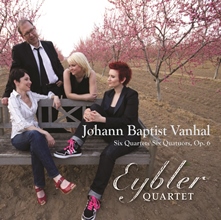

 Montreal’s “Dazzling” 9-piece String Band Explores New Territory
Montreal’s “Dazzling” 9-piece String Band Explores New Territory